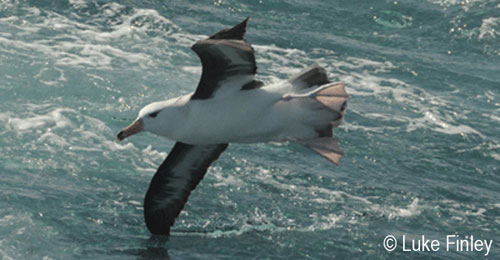The Marine Stewardship Council (MSC) describes itself as the world's leading certification and ecolabelling programme for sustainable seafood. By certifying well-managed fisheries it aims to encourage sustainability - which extends to reducing bycatch mortality of seabirds in longline fisheries.
So far, four longline fisheries for toothfish in the Southern Ocean have been certified, making them obliged to adopt best-practice mitigation measures to reduce seabird mortality, especially of ACAP-listed albatrosses and petrels. The four MSC-certified fisheries are for Antarctic Toothfish Dissostichus mawsoni in the Ross Sea and for Patagonian Toothfish D. eleginoides around Australia's Macquarie Island and Heard & McDonald Islands and in the waters of South Georgia (Islas Georgias del Sur)*(click here).
Two more toothfish fisheries are currently being considered for certification by the MSC. The Falkland Island (Islas Malvinas)* Patagonian Toothfish fishery is under assessment for certification with a site visit taking place this month. Following a revised timetable, the assessment of the SARPC Patagonian Toothfish fishery in the Exclusive Economic Zone around the French islands of Kerguelen and Crozet is now set to continue into 2013.

Black-browed Albatross - at risk to longlines in the Southern Ocean
Photograph by Luke Finley
Meanwhile the Commission for the Conservation of Antarctic Marine Living Resources (CCAMLR) has announced at its recent meeting that seabird bycatch mortality in CCAMLR-managed fisheries has been reduced from close to 7000 seabirds in 1997 to approaching zero in 2012. In addition a combination of surveillance, port and at-sea inspections, the satellite-linked CCAMLR Vessel Monitoring System, black listing and market controls are reported to have significantly reduced Illegal, Unregulated and Unreported (IUU) fishing that undermines the conservation measures adopted by CCAMLR. Fish taken by IUU vessels in the Southern Ocean decreased from an estimated 40 000 tonnes per year in the 1990s to less than 2000 tonnes in 2010/2011 (click here). It is widely believed that IUU fishers do not practice mitigation measures so likely cause high levels of seabird mortality.
To read more about MSC certification of Southern Ocean fisheries search on Marine Stewardship Council on this web site.
John Cooper, ACAP Information Officer, 17 November 2012
*A dispute exists between the Governments of Argentina and the United Kingdom of Great Britain and Northern Ireland concerning sovereignty over the Falkland Islands (Islas Malvinas), South Georgia and the South Sandwich Islands (Islas Georgias del Sur y Islas Sandwich del Sur) and the surrounding maritime areas.

 English
English  Français
Français  Español
Español